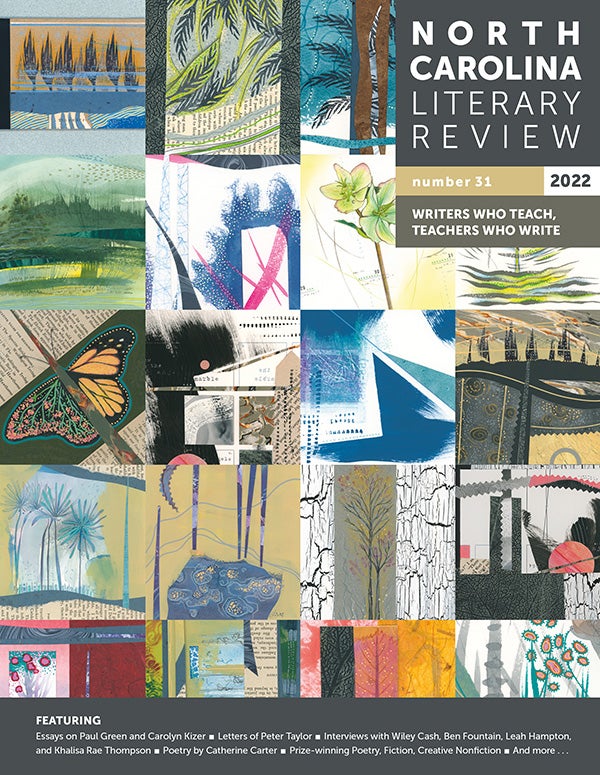Prize-winning content featured in 2022 NCLR issues
The North Carolina Literary Review, produced at East Carolina University, has named the winners of three honors given by the publication — the Paul Green Prize, the John Ehle Prize and the Randall Kenan Prize. Each author receives a $250 honorarium from the sponsor, and their essays will appear in a special feature section on writers/teachers of North Carolina in the 2022 print and online issues of NCLR.

Essays from prize-winning writers will appear in the 2022 print and online issues of the North Carolina Literary Review. (Contributed image)
Georgann Eubanks is the recipient of the 2022 Paul Green Prize for her essay “Paul Green: A Professor of the Practice of Playwriting.” The Paul Green Prize is sponsored by the Paul Green Foundation to encourage content relating to Paul Green (1894-1981), a Pulitzer Prize playwright and social activist, as well as a former UNC Chapel Hill professor. As executive director of the Paul Green Foundation, Eubanks did not accept the honorarium provided by the foundation, allowing NCLR to use the full funding from the foundation for the graphic design of the essay, which will open the 2022 print issue.
The author of several books, most recently “Saving the Wild South,” Eubanks is a founder of the North Carolina Writers’ Network and has taught at public schools, prisons and in corporate settings. She is currently editing a collection of essays about Green.
Marian Janssen is the winner of the 2022 John Ehle Prize for her essay, “Carolyn Kizer: Flamboyant Feminist at Chapel Hill.” The annual John Ehle Prize is sponsored by Press 53 of Winston-Salem to recognize NCLR essays on or interviews with North Carolina writers who have not received the critical attention their writing warrants.
The subject of Janssen’s essay, Carolyn Kizer (1923–2014), another Pulitzer Prize winner, was a critically acclaimed poet and trailblazing feminist. Kizer’s books include the acclaimed poetry collection “Pro Femina.” Janssen’s essay explores the poet’s brief tenure at UNC Chapel Hill in the early 1970s and details her relationships with other North Carolina writers as well as her efforts toward expanding feminism in the Chapel Hill area and beyond. In selecting Janssen’s essay, judge and University of North Georgia professor Tanya Long Bennett praised the author for “bring(ing) the poet and her era to life for contemporary readers and, through its own electric prose, remind(ing) us that a gifted writer and thinker like Kizer can illuminate and colorize the often-banal world.”
Janssen received her doctorate from Radboud University Nijmegen. Her books include “The Kenyon Review 1939-1970: A Critical History” and “Not at All What One Is Used To: The Life and Times of Isabella Gardner.” She is currently writing a biography of Kizer.
Dolly R. Sickles is the winner of the 2022 Randall Kenan Prize for her interview essay “Examining ‘Otherness’ on the Page and in the Classroom with Michele Tracy Berger.” The Randall Kenan Prize is sponsored by the UNC Chapel Hill Creative Writing Program for the year’s best essay or interview with a new or relatively new North Carolina writer, accepted for publication in NCLR. Glenis Redmond, poet-in-residence at the Peace Center for Performing Arts in Greenville, South Carolina, and former mentor poet for the National Student Poet’s Program, selected Sickles’ essay on Berger, saying, “In her writing, Berger does the heavy lifting — providing space for others, as well as reflecting, as an intentional mirror for others to imagine themselves in both the present and the future. The author of this essay was eager to find out whether Michele Tracy Berger is more a writer who teaches or a teacher who writes. With countless published stories and a novel coming out this year, Berger is ever-present in both fields.” Sickles’ interview essay will appear in NCLR Online Fall 2022.
A freelance writer and teacher, Sickles is the author of children’s books and romance novels. Her subject for the Kenan Prize essay, Berger, is a professor in the Department of Women’s and Gender Studies at UNC Chapel Hill who publishes both scholarship and fiction. Berger’s 2017 novella, “Reenu-You,” is an example of the speculative fiction by African American writers that she talked about with Sickles.
“Essays like these allow NCLR to fulfill our mission of promoting the literature of North Carolina writers,” NCLR editor Margaret Bauer said about this year’s winners. “That includes new writers like Michele Tracy Berger and writers from our rich literary history like Paul Green.” She noted too that the essay on Carolyn Kizer reflects how NCLR’s definition of North Carolina writers is broad: “We include the many writers who have made North Carolina home, even for a short period of time.”
Produced since 1992 at ECU, the North Carolina Literary Review has won numerous awards and citations. Visit NCLR Subscriptions for subscription information. The 2022 print issue will be released this summer. Find a complete table of contents for this issue and links to the editor’s introductions on the NCLR website.
Related
Mitchell Named Winner of NCLRS Creative Nonfiction Prize